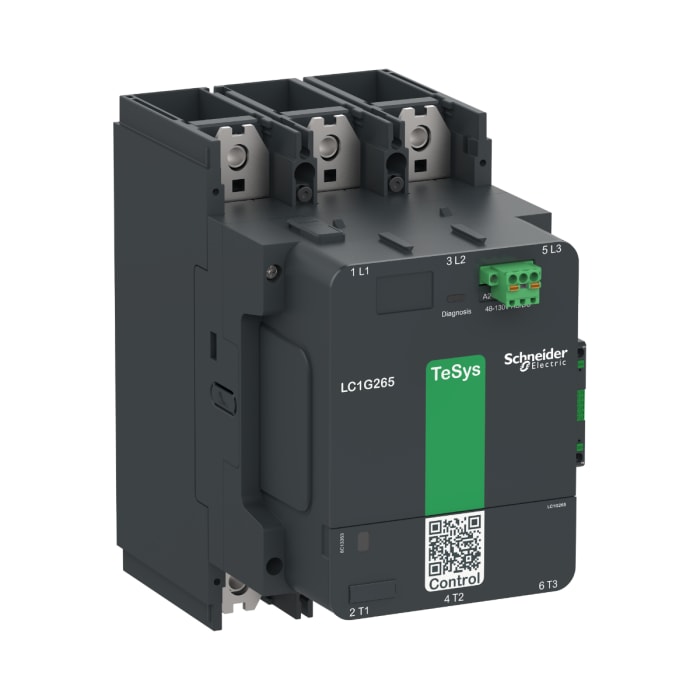Documentos Técnicos
Especificaciones
Brand
Schneider ElectricTensión de la Bobina
220 V ac
Número de polos
3
Tensión Nominal del Contacto
600 V ac
Corriente Nominal de los Contactos
500 A
Gama
TeSys F
Series
LC1F
Clasificación de Potencia
250 kW
Configuración Normal del Estado
5 NA
Número de Contactos Auxiliares
5
Tipo de Terminal
Screw
Profundidad
238mm
Longitud:
233mm
Profundidad
232mm
Temperatura de Funcionamiento Máxima
+70°C
Mínima Temperatura de Funcionamiento
-40°C
País de Origen
Czech Republic
Datos del producto
Contactores Schneider Electric TeSys LC1 - D
Los contactores TeSys de Schneider Electric combinan una larga vida útil mecánica y eléctrica para ofrecer un contactor de alta fiabilidad. La gama se ha diseñado para su integración en sistemas de control y se puede utilizar para crear arrancadores de motor para cualquier tipo de aplicación. Los contactores TeSys ofrecen una configuración sencilla y rápida al tiempo que mantienen la conformidad con los estándares internacionales.
Características y ventajas
• normalmente, las aplicaciones incluyen cargas resistivas y control de motor
• Gran fiabilidad
• excelente calidad
• Alta resistencia a golpes y vibraciones
• Se puede montar en panel con tornillos o en carril DIN
• Accesorios fáciles de instalar
¿Qué implica la categoría de uso AC1 y AC3 para los contactores TeSys?
Las categorías de uso de los contactores definen los valores de conexión y ruptura de corriente en función del tipo de carga controlada y las condiciones del ciclo de funcionamiento.
AC-1: se aplica a todos los dispositivos ac con un factor de potencia de al menos 0,95. Ejemplo de uso: carga resistiva, calefacción, distribución.
AC-3: se aplica a motores de jaula de ardilla donde la ruptura se produce mientras el motor está en funcionamiento. Ejemplo de uso: todos los motores de jaula de ardilla, ascensores, escaleras mecánicas, cintas transportadoras, elevadores de cangilones, compresores, bombas, mezcladoras, unidades de aire acondicionado.
¿Qué accesorios hay disponibles?
• Bloques de contactos auxiliares con acción de barrido dentado
• Bloques de contactos auxiliares de montaje frontal herméticos al polvo
• Bloques de retardo neumático
• Supresores de transitorios de tensión
• Módulos de interfaz y temporizadores electrónicos
• Bloques de enclavamiento mecánico
¿Comprende la gama TeSys D contactores con polos de ruptura doble?
Sí, la gama TeSys D utiliza un movimiento de traslación lineal que proporciona ruptura doble de los polos.

Price on asking
1
Price on asking
1
Información de stock no disponible temporalmente.
Vuelva a verificar más tarde.

Documentos Técnicos
Especificaciones
Brand
Schneider ElectricTensión de la Bobina
220 V ac
Número de polos
3
Tensión Nominal del Contacto
600 V ac
Corriente Nominal de los Contactos
500 A
Gama
TeSys F
Series
LC1F
Clasificación de Potencia
250 kW
Configuración Normal del Estado
5 NA
Número de Contactos Auxiliares
5
Tipo de Terminal
Screw
Profundidad
238mm
Longitud:
233mm
Profundidad
232mm
Temperatura de Funcionamiento Máxima
+70°C
Mínima Temperatura de Funcionamiento
-40°C
País de Origen
Czech Republic
Datos del producto
Contactores Schneider Electric TeSys LC1 - D
Los contactores TeSys de Schneider Electric combinan una larga vida útil mecánica y eléctrica para ofrecer un contactor de alta fiabilidad. La gama se ha diseñado para su integración en sistemas de control y se puede utilizar para crear arrancadores de motor para cualquier tipo de aplicación. Los contactores TeSys ofrecen una configuración sencilla y rápida al tiempo que mantienen la conformidad con los estándares internacionales.
Características y ventajas
• normalmente, las aplicaciones incluyen cargas resistivas y control de motor
• Gran fiabilidad
• excelente calidad
• Alta resistencia a golpes y vibraciones
• Se puede montar en panel con tornillos o en carril DIN
• Accesorios fáciles de instalar
¿Qué implica la categoría de uso AC1 y AC3 para los contactores TeSys?
Las categorías de uso de los contactores definen los valores de conexión y ruptura de corriente en función del tipo de carga controlada y las condiciones del ciclo de funcionamiento.
AC-1: se aplica a todos los dispositivos ac con un factor de potencia de al menos 0,95. Ejemplo de uso: carga resistiva, calefacción, distribución.
AC-3: se aplica a motores de jaula de ardilla donde la ruptura se produce mientras el motor está en funcionamiento. Ejemplo de uso: todos los motores de jaula de ardilla, ascensores, escaleras mecánicas, cintas transportadoras, elevadores de cangilones, compresores, bombas, mezcladoras, unidades de aire acondicionado.
¿Qué accesorios hay disponibles?
• Bloques de contactos auxiliares con acción de barrido dentado
• Bloques de contactos auxiliares de montaje frontal herméticos al polvo
• Bloques de retardo neumático
• Supresores de transitorios de tensión
• Módulos de interfaz y temporizadores electrónicos
• Bloques de enclavamiento mecánico
¿Comprende la gama TeSys D contactores con polos de ruptura doble?
Sí, la gama TeSys D utiliza un movimiento de traslación lineal que proporciona ruptura doble de los polos.



